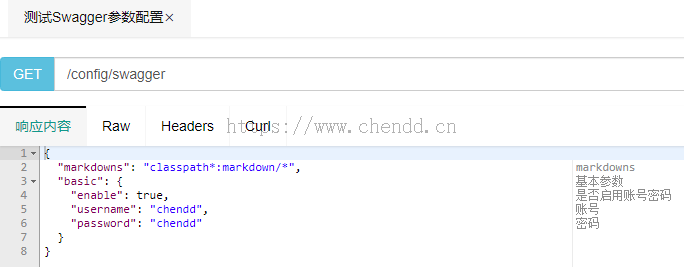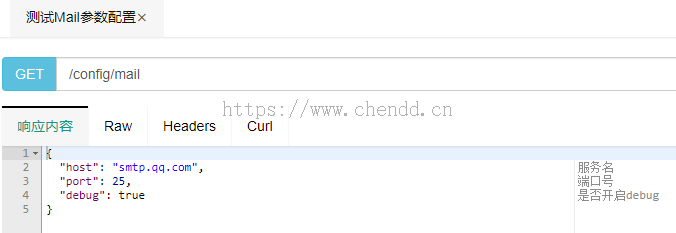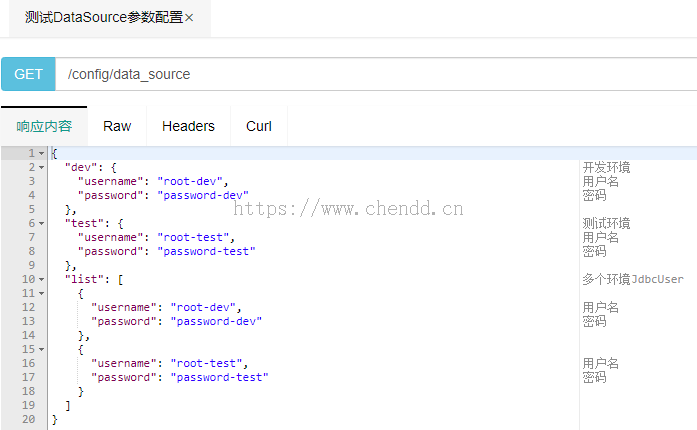Spring Boot 载入yaml配置文件
admin 发布于:2022-05-09 10:50:24
阅读:loading
前文中说到过对于properties和yaml这两种格式的配置文件,由于properties格式已经使用过无数次了,在博客建站之初处于学习了解的实践的目的选择了相对不太熟悉的yaml格式,现又将此格式的参数配置实践整理汇总,围绕一些常规格式和与常规应用契合度高的场景,本次将提供3个案例来实现具体的参数配置,具体参考如下。
#swagger-ui-bootstrap
swagger:
markdowns: classpath*:markdown/*
basic:
enable: true
username: chendd
password: chenddpackage cn.chendd.modules.yaml.config;
import io.swagger.annotations.ApiModelProperty;
import lombok.Data;
import org.springframework.boot.context.properties.ConfigurationProperties;
import org.springframework.context.annotation.PropertySource;
import org.springframework.stereotype.Component;
/**
* Swagger参数获取
*
* @author chendd
* @date 2022/5/28 20:24
*/
@Component
@ConfigurationProperties(prefix = "swagger")
@Data
public class SwaggerConfig {
@ApiModelProperty("markdowns")
private String markdowns;
@ApiModelProperty("基本参数")
private Basic basic;
@Data
public static class Basic {
@ApiModelProperty("是否启用账号密码")
private Boolean enable;
@ApiModelProperty("账号")
private String username;
@ApiModelProperty("密码")
private String password;
}
}
mail:
host: smtp.qq.com
port: 25
debug: truepackage cn.chendd.modules.yaml.config;
import io.swagger.annotations.ApiModelProperty;
import lombok.Data;
import org.springframework.beans.factory.annotation.Value;
import org.springframework.boot.context.properties.ConfigurationProperties;
import org.springframework.context.annotation.ImportResource;
import org.springframework.context.annotation.PropertySource;
import org.springframework.stereotype.Component;
/**
* Email参数配置
*
* @author chendd
* @date 2022/5/28 19:50
*/
@Component
@PropertySource(encoding = "utf-8" , value = "classpath:yaml/data.yaml")
@ConfigurationProperties(prefix = "mail")
@Data
public class MailConfig {
@ApiModelProperty("服务名")
@Value("${host}")
private String host;
@ApiModelProperty("端口号")
@Value("${port}")
private Integer port;
@ApiModelProperty("是否开启debug")
@Value("${debug}")
private Boolean debug;
}
jdbc:
datasource:
dev: {username: root-dev , password: password-dev}
test:
username: root-test
password: password-test
list:
- {username: root-dev , password: password-dev}
- {username: root-test , password: password-test}package cn.chendd.modules.yaml.config;
import io.swagger.annotations.ApiModelProperty;
import lombok.Data;
import org.springframework.beans.factory.annotation.Value;
import org.springframework.boot.context.properties.ConfigurationProperties;
import org.springframework.boot.env.YamlPropertySourceLoader;
import org.springframework.context.annotation.PropertySource;
import org.springframework.core.io.support.DefaultPropertySourceFactory;
import org.springframework.core.io.support.EncodedResource;
import org.springframework.core.io.support.PropertySourceFactory;
import org.springframework.stereotype.Component;
import java.io.IOException;
import java.util.List;
/**
* dataSource参数配置
*
* @author chendd
* @date 2022/5/28 19:57
*/
@Component
@PropertySource(encoding = "utf-8" , value = "classpath:yaml/data.yaml" , factory = JdbcDataSourceConfig.JdbcDataSourceFactory.class)
@ConfigurationProperties(prefix = "jdbc.datasource")
@Data
public class JdbcDataSourceConfig {
@ApiModelProperty("开发环境")
private JdbcUser dev;
@ApiModelProperty("测试环境")
private JdbcUser test;
@ApiModelProperty("多个环境JdbcUser")
private List<JdbcUser> list;
@Data
public static class JdbcUser {
@ApiModelProperty("用户名")
private String username;
@ApiModelProperty("密码")
private String password;
}
public static class JdbcDataSourceFactory extends DefaultPropertySourceFactory {
@Override
public org.springframework.core.env.PropertySource<?> createPropertySource(String name, EncodedResource resource) throws IOException {
if (resource == null) {
return super.createPropertySource(name, resource);
}
String sourceName = name != null ? name : resource.getResource().getFilename();
return new YamlPropertySourceLoader().load(sourceName , resource.getResource()).get(0);
}
}
}
(1)待读取的参数来源若为application.yaml文件中时,参数映射类无需设置@PropertySource注解来指定读取的文件参数;
(2)待读取的参数来源若为application.yaml文件中时,可注入基本类型的参数和对象类型的参数,同时无需使用@Value注解;
(3)待读取的参数来源若为自定义的文件(data.yaml)中时,需要设置@PropertySource注解来指定读取的文件参数,需要配合@Value注解使用,同时默认不支持对象类型的参数注入;
(4)待读取的参数来源若为自定义的文件(data.yaml)中时,若读取的参数为对象类型时需要自己重写Factory来实现自定义yaml文件的读取;
(5)yaml文件中定义的对象类型有两种方式,详见“读取自定义data.yaml文件复杂对象”处的参数定义;
源码工程下载:![]() 源码下载.zip;
源码下载.zip;
点赞





发表评论
当前回复:作者






 欢迎来到陈冬冬的学习天地 | 学习与经验整理分享平台
欢迎来到陈冬冬的学习天地 | 学习与经验整理分享平台
